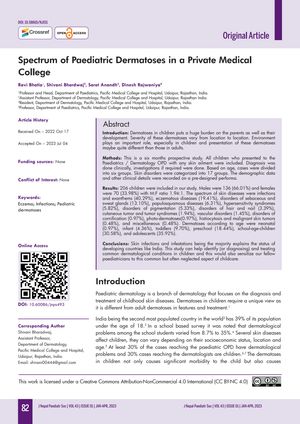Spectrum of Pediatric Dermatoses in a Private Medical College
September 2023
in “
Journal of Nepal Paediatric Society
”

TLDR Skin infections and rashes are the most common skin problems in children.
This six-month prospective study examined the spectrum of pediatric dermatoses in 206 children at a private medical college. The study found that skin infections and exanthems were the most common conditions (40.29%), followed by eczematous diseases (19.41%) and disorders of sebaceous and sweat glands (13.10%). The study highlighted the significant burden of skin diseases in children, particularly in developing countries like India, and emphasized the need for better diagnosis and treatment of these conditions. The findings aim to raise awareness among pediatricians about the prevalence and variety of skin disorders in children.





